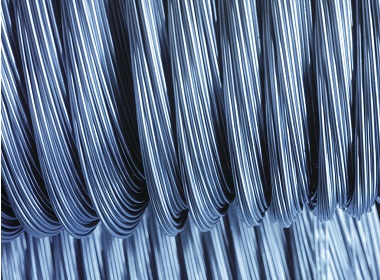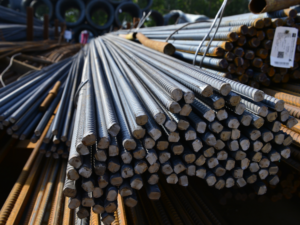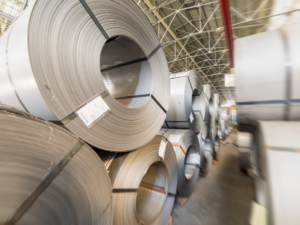July ferrous scrap prices across Europe rose sharply for the third consecutive month to new record index highs, as strong demand for premium ferrous scrap grades continued to support prices, market participants said.
Shredded scrap contracts for July settlements were largely heard ranging from Eur440-Eur460/mt delivered to the mill in Northern Europe, although some sources cited workable levels as high as Eur475/mt delivered.
In Northern Europe, Platts’ June assessment for domestic shredded scrap was at a record high of Eur432.50/mt delivered.
Across most grades, market sources cited a rollover from June prices to Eur10/mt up on the month. However, one German supplier had noted that “two German mills have increased prices by Eur50/mt for new cuttings,” highlighting the strong demand for higher quality scrap grades.
Material feed into shredders was reported to be tight, allowing for a continued higher premium for shredded scrap prices over heavy melting scrap grades. Supply was not a concern for heavy melting scrap grades, with substantial volumes sold into the deepsea export market and Turkey the main buyer.
Steelmaker sources lamented the fact that it remains difficult to find raw materials and said that most prices had increased for the scrap monthly contracts by around Eur10/mt on the month. However, they added that they were managing well to make a margin amid a strong finished steel market.
Finished steel prices firm
Platts assessed Northwest European hot-rolled coil down Eur3/mt to Eur1,178/mt July 8 ($1,394.93/mt) ex-works Ruhr, but prices were still firm at multiyear highs. Flat steel buyers held back from buying, with imports more desirable because of lower prices and similar lead times to domestic sellers.
Long steel market sentiment also remained strong. Northern European customers were only buying rebar as per their requirements ahead of the summer holidays, sources told Platts.
“Rebar supply is good, but I am not doing long-term contracts because it’s too dangerous,” one Benelux-based distributor source told Platts. “I am only selling [to end-users] what is immediately available with mills.”
The distributor also noted that with incoming Russian export duties on finished steel, prices for rebar might move higher, with any downward price correction not expected until September.
“The extension of the safeguard is a positive factor,” one European mill source said. “I also heard that Turkish rebar quota is already full for the third and fourth quarters but it’s not anything unusual. It is not that the market got flooded. It happens every quarter.”
About 3,409 mt, or 5.5%, of the total July-September quota of 61,938 mt for Turkish-origin rebar imports into the EU, which became active July 1, remained available. 68 mt was awaiting allocation as of 6 pm London time on July 8.
Riva fire impact limited
In late June, Belgian long steel producer Riva Thy-Marcinelle had halted production for two weeks following a fire at its Charleroi mill, sources said June 23. Riva was heard to have reassured its clients in a letter in which it said that the mill could deliver from stocks and that they were planning to restart production very soon.
The mill had restarted production during the week ended July 2, market sources said, noting that Riva’s absence had a limited impact on rebar pricing.
Another distributor source in the Benelux region reported that dealings with Riva were back to normal but the mill will be undergoing summer maintenance in the near-term.
“The demand will stay but deliveries will be postponed till after summer. This happens every year, so it is not significant,” he said and cited a deal value for 150 mt of rebar at Eur825/mt delivered.
Rebar offers into Western and Central Europe, including Germany, were at Eur915-Eur920/mt delivered, while one seller source noted indicative mill offers for domestic rebar in Northwest Europe around Eur850-Eur920/mt delivered.
“If we look at the fundamentals in Europe, there is still a large demand of steel, while steelmaker production is now limited following all the production cuts, and on top of that, Far East market prices are moving up so I am confident prices will continue to be strong,” a European long steel buyer said.
Platts assessed TSI Northwest Europe Rebar at Eur830/mt ex-works July 2, up Eur40/mt since June 4, when the index stood at Eur790/mt delivered.
Eurozone construction companies signaled stronger optimism regarding the year-ahead outlook for activity, the strongest since June 2019, according to the latest IHS Markit Eurozone Construction PMI. IHS Markit is subject to a merger with S&P Global pending regulatory approval.
The IHS Markit Eurozone Construction Total Activity Index was unchanged on the month at 50.3 in June, “indicating a marginal expansion in construction activity, which means that Eurozone construction activity has expanded in each of the latest four months.” An index figure below 50 suggests a fall in activity month on month.
Southern European shredded scrap also hikes
In Spain and Italy, prices remained firmly above the Northern European market, with E40 shredded scrap heard at Eur460/mt delivered to the mill in Spain and at Eur470-475/mt delivered to the mill in Italy, although some sell-side sources cited shredded scrap prices as high as Eur520/mt delivered in Italy.
Platts’ assessment for Southern European shredded scrap was at Eur447.50/mt delivered for June contracts.
Platts assessed South Europe export rebar at Eur715/mt FOB July 2, down Eur5/mt on the week, but remaining at multiyear highs.
Turkish deepsea import ferrous scrap prices have remained largely rangebound between $495-$509/mt since the beginning of June. Platts assessed Turkish imports of premium heavy melting scrap 1/2 (80:20) July 8 at $495/mt CFR, down $3/mt on the week.
— Viral Shah, Rabia Arif, Annalisa Villa






